Daniel Zhang-Li
Handling Students Dropouts in an LLM-driven Interactive Online Course Using Language Models
Aug 24, 2025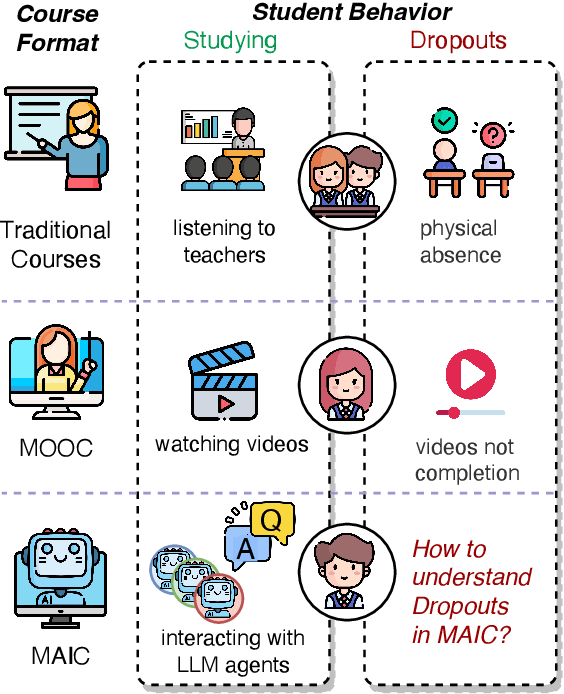

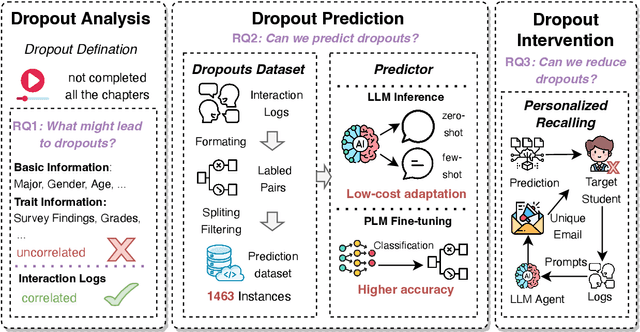
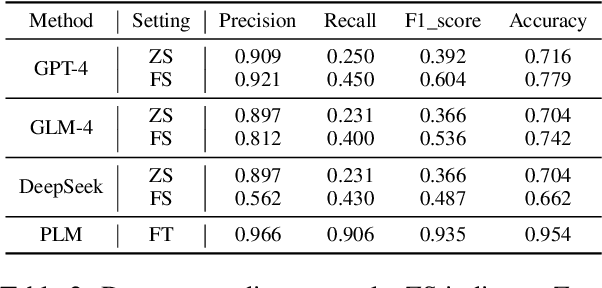
Abstract:Interactive online learning environments, represented by Massive AI-empowered Courses (MAIC), leverage LLM-driven multi-agent systems to transform passive MOOCs into dynamic, text-based platforms, enhancing interactivity through LLMs. This paper conducts an empirical study on a specific MAIC course to explore three research questions about dropouts in these interactive online courses: (1) What factors might lead to dropouts? (2) Can we predict dropouts? (3) Can we reduce dropouts? We analyze interaction logs to define dropouts and identify contributing factors. Our findings reveal strong links between dropout behaviors and textual interaction patterns. We then propose a course-progress-adaptive dropout prediction framework (CPADP) to predict dropouts with at most 95.4% accuracy. Based on this, we design a personalized email recall agent to re-engage at-risk students. Applied in the deployed MAIC system with over 3,000 students, the feasibility and effectiveness of our approach have been validated on students with diverse backgrounds.
LecEval: An Automated Metric for Multimodal Knowledge Acquisition in Multimedia Learning
May 04, 2025Abstract:Evaluating the quality of slide-based multimedia instruction is challenging. Existing methods like manual assessment, reference-based metrics, and large language model evaluators face limitations in scalability, context capture, or bias. In this paper, we introduce LecEval, an automated metric grounded in Mayer's Cognitive Theory of Multimedia Learning, to evaluate multimodal knowledge acquisition in slide-based learning. LecEval assesses effectiveness using four rubrics: Content Relevance (CR), Expressive Clarity (EC), Logical Structure (LS), and Audience Engagement (AE). We curate a large-scale dataset of over 2,000 slides from more than 50 online course videos, annotated with fine-grained human ratings across these rubrics. A model trained on this dataset demonstrates superior accuracy and adaptability compared to existing metrics, bridging the gap between automated and human assessments. We release our dataset and toolkits at https://github.com/JoylimJY/LecEval.
LongWriter-V: Enabling Ultra-Long and High-Fidelity Generation in Vision-Language Models
Feb 20, 2025Abstract:Existing Large Vision-Language Models (LVLMs) can process inputs with context lengths up to 128k visual and text tokens, yet they struggle to generate coherent outputs beyond 1,000 words. We find that the primary limitation is the absence of long output examples during supervised fine-tuning (SFT). To tackle this issue, we introduce LongWriter-V-22k, a SFT dataset comprising 22,158 examples, each with multiple input images, an instruction, and corresponding outputs ranging from 0 to 10,000 words. Moreover, to achieve long outputs that maintain high-fidelity to the input images, we employ Direct Preference Optimization (DPO) to the SFT model. Given the high cost of collecting human feedback for lengthy outputs (e.g., 3,000 words), we propose IterDPO, which breaks long outputs into segments and uses iterative corrections to form preference pairs with the original outputs. Additionally, we develop MMLongBench-Write, a benchmark featuring six tasks to evaluate the long-generation capabilities of VLMs. Our 7B parameter model, trained with LongWriter-V-22k and IterDPO, achieves impressive performance on this benchmark, outperforming larger proprietary models like GPT-4o. Code and data: https://github.com/THU-KEG/LongWriter-V
Awaking the Slides: A Tuning-free and Knowledge-regulated AI Tutoring System via Language Model Coordination
Sep 11, 2024Abstract:The vast pre-existing slides serve as rich and important materials to carry lecture knowledge. However, effectively leveraging lecture slides to serve students is difficult due to the multi-modal nature of slide content and the heterogeneous teaching actions. We study the problem of discovering effective designs that convert a slide into an interactive lecture. We develop Slide2Lecture, a tuning-free and knowledge-regulated intelligent tutoring system that can (1) effectively convert an input lecture slide into a structured teaching agenda consisting of a set of heterogeneous teaching actions; (2) create and manage an interactive lecture that generates responsive interactions catering to student learning demands while regulating the interactions to follow teaching actions. Slide2Lecture contains a complete pipeline for learners to obtain an interactive classroom experience to learn the slide. For teachers and developers, Slide2Lecture enables customization to cater to personalized demands. The evaluation rated by annotators and students shows that Slide2Lecture is effective in outperforming the remaining implementation. Slide2Lecture's online deployment has made more than 200K interaction with students in the 3K lecture sessions. We open source Slide2Lecture's implementation in https://anonymous.4open.science/r/slide2lecture-4210/.
Simulating Classroom Education with LLM-Empowered Agents
Jun 27, 2024



Abstract:Large language models (LLMs) have been employed in various intelligent educational tasks to assist teaching. While preliminary explorations have focused on independent LLM-empowered agents for specific educational tasks, the potential for LLMs within a multi-agent collaborative framework to simulate a classroom with real user participation remains unexplored. In this work, we propose SimClass, a multi-agent classroom simulation framework involving user participation. We recognize representative class roles and introduce a novel class control mechanism for automatic classroom teaching, and conduct user experiments in two real-world courses. Utilizing the Flanders Interactive Analysis System and Community of Inquiry theoretical frame works from educational analysis, we demonstrate that LLMs can simulate traditional classroom interaction patterns effectively while enhancing user's experience. We also observe emergent group behaviors among agents in SimClass, where agents collaborate to create enlivening interactions in classrooms to improve user learning process. We hope this work pioneers the application of LLM-empowered multi-agent systems in virtual classroom teaching.
TableLLM: Enabling Tabular Data Manipulation by LLMs in Real Office Usage Scenarios
Apr 01, 2024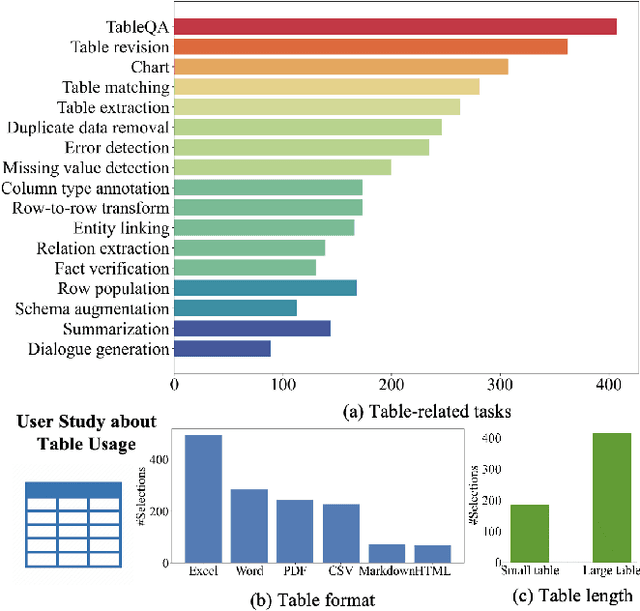
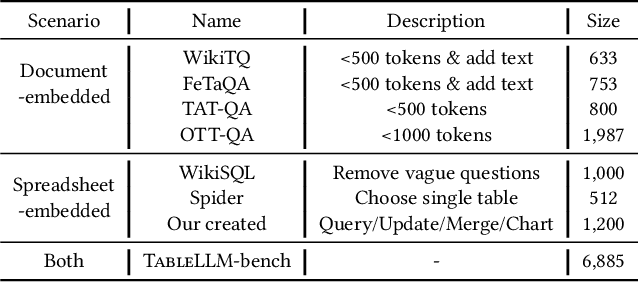
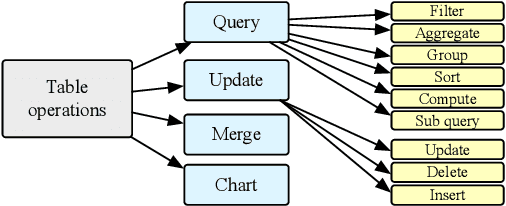
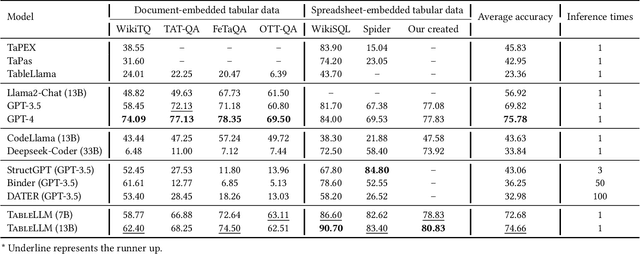
Abstract:We introduce TableLLM, a robust large language model (LLM) with 13 billion parameters, purpose-built for proficiently handling tabular data manipulation tasks, whether they are embedded within documents or spreadsheets, catering to real-world office scenarios. We propose a distant supervision method for training, which comprises a reasoning process extension strategy, aiding in training LLMs to understand reasoning patterns more effectively as well as a cross-way validation strategy, ensuring the quality of the automatically generated data. To evaluate the performance of TableLLM, we have crafted a benchmark tailored to address both document and spreadsheet formats as well as constructed a well-organized evaluation pipeline capable of handling both scenarios. Thorough evaluations underscore the advantages of TableLLM when compared to various existing general-purpose and tabular data-focused LLMs. We have publicly released the model checkpoint, source code, benchmarks, and a web application for user interaction.Our codes and data are publicly available at https://github.com/TableLLM/TableLLM.
Reverse That Number! Decoding Order Matters in Arithmetic Learning
Mar 09, 2024



Abstract:Recent advancements in pretraining have demonstrated that modern Large Language Models (LLMs) possess the capability to effectively learn arithmetic operations. However, despite acknowledging the significance of digit order in arithmetic computation, current methodologies predominantly rely on sequential, step-by-step approaches for teaching LLMs arithmetic, resulting in a conclusion where obtaining better performance involves fine-grained step-by-step. Diverging from this conventional path, our work introduces a novel strategy that not only reevaluates the digit order by prioritizing output from the least significant digit but also incorporates a step-by-step methodology to substantially reduce complexity. We have developed and applied this method in a comprehensive set of experiments. Compared to the previous state-of-the-art (SOTA) method, our findings reveal an overall improvement of in accuracy while requiring only a third of the tokens typically used during training. For the purpose of facilitating replication and further research, we have made our code and dataset publicly available at \url{https://anonymous.4open.science/r/RAIT-9FB7/}.
KoLA: Carefully Benchmarking World Knowledge of Large Language Models
Jun 15, 2023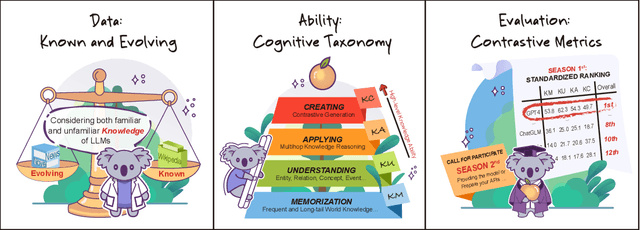
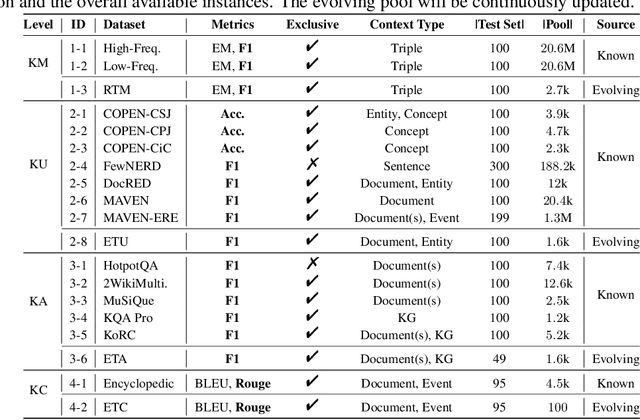
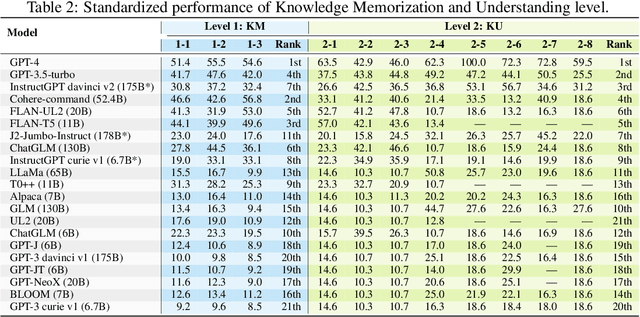

Abstract:The unprecedented performance of large language models (LLMs) necessitates improvements in evaluations. Rather than merely exploring the breadth of LLM abilities, we believe meticulous and thoughtful designs are essential to thorough, unbiased, and applicable evaluations. Given the importance of world knowledge to LLMs, we construct a Knowledge-oriented LLM Assessment benchmark (KoLA), in which we carefully design three crucial factors: (1) For ability modeling, we mimic human cognition to form a four-level taxonomy of knowledge-related abilities, covering $19$ tasks. (2) For data, to ensure fair comparisons, we use both Wikipedia, a corpus prevalently pre-trained by LLMs, along with continuously collected emerging corpora, aiming to evaluate the capacity to handle unseen data and evolving knowledge. (3) For evaluation criteria, we adopt a contrastive system, including overall standard scores for better numerical comparability across tasks and models and a unique self-contrast metric for automatically evaluating knowledge hallucination. We evaluate $21$ open-source and commercial LLMs and obtain some intriguing findings. The KoLA dataset and open-participation leaderboard are publicly released at https://kola.xlore.cn and will be continuously updated to provide references for developing LLMs and knowledge-related systems.
GLM-Dialog: Noise-tolerant Pre-training for Knowledge-grounded Dialogue Generation
Feb 28, 2023
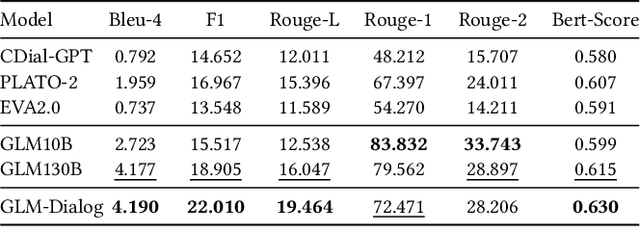


Abstract:We present GLM-Dialog, a large-scale language model (LLM) with 10B parameters capable of knowledge-grounded conversation in Chinese using a search engine to access the Internet knowledge. GLM-Dialog offers a series of applicable techniques for exploiting various external knowledge including both helpful and noisy knowledge, enabling the creation of robust knowledge-grounded dialogue LLMs with limited proper datasets. To evaluate the GLM-Dialog more fairly, we also propose a novel evaluation method to allow humans to converse with multiple deployed bots simultaneously and compare their performance implicitly instead of explicitly rating using multidimensional metrics.Comprehensive evaluations from automatic to human perspective demonstrate the advantages of GLM-Dialog comparing with existing open source Chinese dialogue models. We release both the model checkpoint and source code, and also deploy it as a WeChat application to interact with users. We offer our evaluation platform online in an effort to prompt the development of open source models and reliable dialogue evaluation systems. The additional easy-to-use toolkit that consists of short text entity linking, query generation, and helpful knowledge classification is also released to enable diverse applications. All the source code is available on Github.
 Add to Chrome
Add to Chrome Add to Firefox
Add to Firefox Add to Edge
Add to Edge